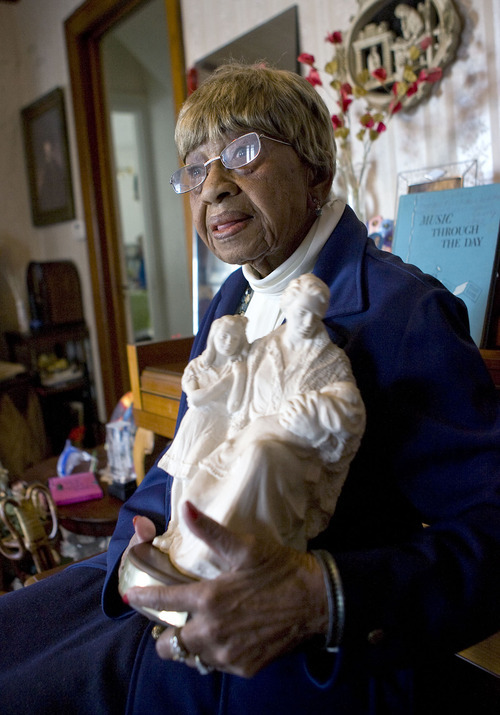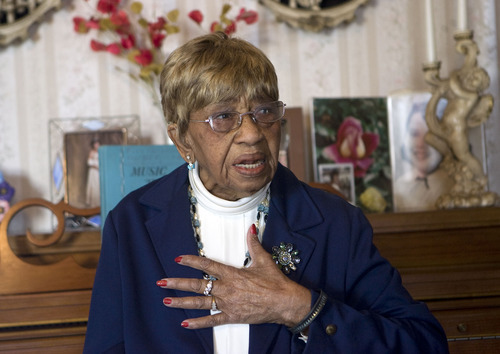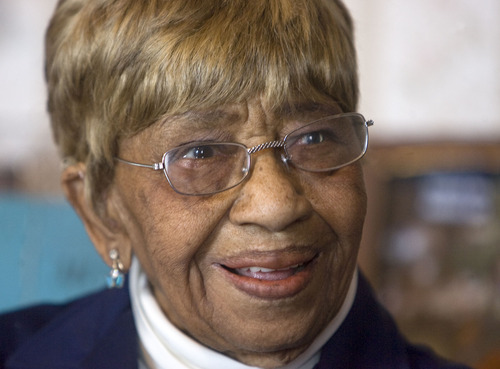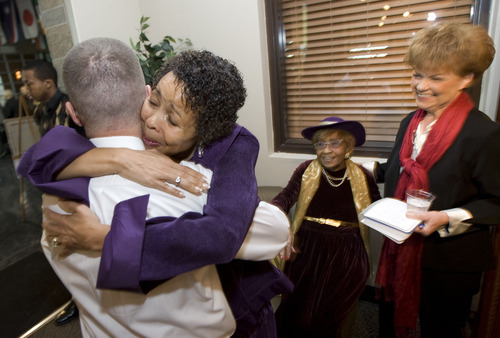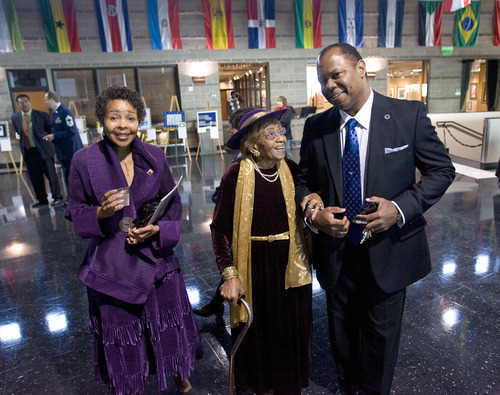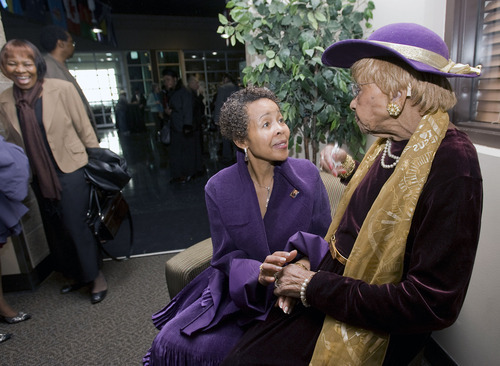This is an archived article that was published on sltrib.com in 2011, and information in the article may be outdated. It is provided only for personal research purposes and may not be reprinted.
Layton • Ruby Jewell Timms Price may be 95 years old, and, as she puts it, "dead so many times I'm a ghost," but that hardly stops her from spouting off about politicians or the latest tragedy-cum-political dust-up.
She's re-reading a book about Sen. Orrin Hatch titled Gentleman of the Senate, but thinks it's high time the gentleman bows out.
The tea party? "Un-Christian."
Even the attack in Tucson incites her. "Why does everybody have to be packin' a gun?" Price asks. "If you don't have a weapon, you won't commit a crime."
An educator and community activist for nearly seven decades in Davis and Weber counties, the outspoken and politically savvy Price clearly likes an audience. But when it's time to talk about one of her heroes, the Rev. Martin Luther King Jr., Price returns to lessons she learned as a girl in a Pentecostal home in east Texas nearly a century ago.
"I am a human-rights person. Martin Luther King Jr. was a human-rights person," says Price, who likes to be called Grandma Ruby. "I'm for all of the Heavenly Father's children."
—
A special teacher • Indeed Price spent many decades working on causes to better the lives of children and the disadvantaged.
Believed to be the first black schoolteacher in Utah, she began working at the Intermountain Indian School in Brigham City in 1950 and later taught first and second grades in Layton.
Scott Nye remembers learning to read, write and do arithmetic from Price at Vae View Elementary in 1968-69.
"She had a cane with knots all over it and I remember thinking, 'I hope she doesn't ever hit me with that,' " Nye recalls. "It didn't take me long to figure out she would never have hit any kids with that. She would tap on our desk or the backs of our chairs to get our attention."
Nye now works for Davis School District, carrying mail and equipment between schools.
"We all have them — special teachers that stand out in our lives," he says. "She was one of mine."
Price, a mother of five daughters and a son, was named Utah Mother of the Year in 1977 and, 14 years later, was given the Joint Action in Community Service Inc.'s National Volunteer of the Year award for service to the Clearfield Job Corps Center.
She was the first president of the Ogden branch of the NAACP and later, in the 1980s, chairwoman of the Davis County Republican Party.
She served on statewide ethnic advisory boards, launched Scout programs for girls and boys in Davis County, volunteered for a nonprofit that helped people with disabilities and chauffeured surveyors who visited migrants camps in order to build a case for a Community Action Agency in the 1960s.
Price's last volunteering stint, speaking to at-risk teens, ended less than three years ago.
In March, Davis School District will put her name on four scholarships it provides to college-bound minority students who want to be teachers.
"She gives unselfishly to everybody," says Jackie Thompson, educational-equity coordinator for the district.
A few weeks ago, Thompson took her 3-year-old granddaughter to meet Price. The inveterate teacher couldn't resist. "She's standing there saying, 'Now, don't bend your knees. You keep them straight and you sing, "Head, fingers, knees and toes, knees and toes." ' And she reached way down.
"She has more energy than anyone I know," Thompson says, "at 95 or 25."
That Price worked for Davis School District at all is surprising, given her first conversation with the superintendent in the late 1940s. She visited his office to apply for a teaching job, a profession she had practiced in Texas before moving to Utah in 1943.
"He said, 'We have never hired Negroes and we will not hire Negroes in the Davis School District,' " Price recalls. "I said to him, 'I'm not asking you to hire Negroes. I'm asking you to hire me.' "
Several years later, after the civil-rights movement opened some doors, she went to work for Davis schools.
—
'I didn't know to give up' • Price says she was reared in an affluent, educated home in Kilgore, Texas. Her family owned land and she went to small Christian schools with black and white children.
When her soldier brother was temporarily missing early in World War II in the Indian Ocean, she quit her teaching job, took a government exam and was determined to become a fighter pilot.
"I said, 'I'll just take my crew, go and kill them all and bring brother home,' " Price remembers. "I thought I could do that."
Instead, she came on a troop train to Utah — "It looked like we were at the end of the world" — and joined an aeronautics class before settling into other jobs with what was then called the Ogden Arsenal.
Price volunteered to help run the recreation center that served black civilian workers living on base and, she says, was insistent that the center get the same resources as the white rec center. Baseball, softball, basketball teams were launched.
"Segregation is bad. It teaches people not to ask for things. They think they'll be denied," Price says. That wasn't a problem for her. "I didn't know to give up."
She remembers helping illiterate men learn to read and write, and organizing a Sunday School Easter play that featured her as the Virgin Mary.
—
"Ruby was our pinup" • Frank Satterwhite, who hung out at the rec center, remembers Price also had a rakish side. The then-Ruby Jewell Timms gave the men pictures of herself in a bathing suit.
"Ruby was our pinup in the barracks," Satterwhite recalls. "She was just as cute as a bug."
At the center, Price would let the men play Chinese checkers or chess into the night, after curfew.
"We'd just pull down the curtains and finish our game," Satterwhite says. "She was dynamic. She just liked people."
Most black civilian workers had to live on base because segregation made it impossible to find a home, says Satterwhite, who, like Price, was a charter member of the NAACP's Ogden branch. He is now 89.
Ruby Timms met Sgt. Ralph Price, who supervised road construction and landscaping on base, and they married in 1944. The family lived in Layton's Verdeland Housing Project, homes later destroyed to make way for Layton High School and the city complex.
When the couple bought a stately red brick home with acreage on west Gentile Street, the Prices became the first blacks to own property in Davis County, according to city history.
The couple joined the LDS Church, although Price now believes churches only divide people. She has a large, framed print with a picture of LDS President Spencer W. Kimball surrounded by his predecessors propped against one wall while a crucifix rests on her coffee table.
Ralph Price died in 2001, and Ruby Price remains in her home. She wears a hearing aid, but still strains to hear. She lost her youngest daughter in 2009. Her son lives with her and a daughter lives nearby.
—
Yes she did — vote for Obama • That the former county Republican leader's politics have changed through the years is obvious. A lawn sign from President Barack Obama's 2008 campaign is part of her front room décor.
"She told me, no way was she going to let that pass and not vote for Obama," says Betty Sawyer, an Ogden Democrat who sought Price's advice for a political campaign last year.
Price also was among the protesters objecting to Ronnie Lee Gardner's execution last year. She was honored in 2009 at an NAACP anniversary banquet and regaled younger activists with her stories, says Sawyer, who was then president of the branch.
"A lot of people call her Grandma Ruby," Sawyer says. "The younger ones especially. They've adopted her and she's adopted them."
Grandma Ruby's wisdom
"When I came to the state of Utah, to be a woman of color was to be cursed."
"My family is first with me. It's not my country with me."
"If he's your husband, you tell that lazy bugger he has to get out there and take care of his family."
"I was born free and independent and I intend to die free and independent."
"I used to think I must be a little crazy. I don't hold grudges. I feel sorry for people when they do things against me."
"Reading is the key. If you're well-read, you can do anything."
"The discrimination wasn't just about color. It was against women."
"I wish I had 20 years to go. I'd work on education reform and I'd teach [that we are all in] God's image."
"Religions divide us, I've learned. We all think we're right."
"I don't want to be paid for doing something to help someone else. But they could have offered."


